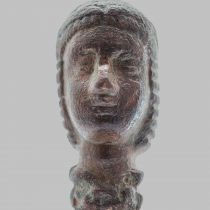Μodern humans emerged more than 300,000 years ago
Results from a study of ancient DNA show that the 2000-year-old remains of a boy found at Ballito Bay in KwaZulu-Natal during the 1960s, helped to rewrite human history.
Christian Dior at the Denver Art Museum
The 70-year history of the Christian Dior House of Haute Couture will be revived in a retrospective exhibition to be organized in November 2018 at the Denver Art Museum.
Rock art and infant pot burials of the site at Vathy, Astypalaia
Since 2011 Andreas Vlachopoulos has been directing archaeological fieldwork at the site of Vathy on Astypalaia.
MONEY: Tangible symbols in ancient Greece
Exhibition organized by the Museum of Cycladic Art and the Alpha Bank Numismatic Collection.
Thouria: The ancient orchestra has been “lit up”
At the highest point of the hill where the ancient city of Thouria lies, inside an olive grove where in 2016 Dr Xeni Arapoyanni discovered the remains of an ancient theatre she had spent years searching for, this year the orchestra was also brought to light.
Finland’s wetlands are an internationally significant archaeological repository
Dissertation focuses particularly on Stone Age wooden fishing structure remains.
Isotopic analyses link the lives of Late Neolithic individuals to burial location in Spain
An isotopic analysis of megalithic graves and caves in Spain may suggest the existence of a degree of differentiation in the lifeways of people buried in these different funerary sites.
Chinese vase sold for a record 4.3 million euros
According to the auction catalogue, the vase dates from the early 20th century, but bears a dubiously authentic stamp of the 18th century Qianlong era.
Opening of the Archaeological Site of Idalion
The Archaeological Site of Idalion consists of the excavated part of the administrative centre (palace) of the ancient city-kingdom, that functioned during the Cypro-archaic and Cypro-classical period (c. 750-310 BC).
ICARO – ΙΚΑΡΟΣ: The Factory of Rhodes 1928-1988
The exhibition presents the history and production of a company closely connected with Rhodes, that has been a key element of the island's economy for many decades.
Chinese painting at the National Museum of Contemporary Art, Athens
Through a "marriage" of traditional Chinese aesthetics with elements of its western counterpart, modern Chinese painters express feelings, notions, ideas and world views.
Two Fabergé knives have reappeared, one hundred years later
Everyone believed that after the October Revolution the silver knives had been melted in the foundry, like the rest of the Fabergé silver tableware.
Remains of decapitated toads found in jar from 4,000-year-old tomb
Research by the Israel Antiquities Authority in cooperation with academic institutions unearthed a jar containing decapitated toads.
How aerial thermal imagery is revolutionizing archaeology
A Dartmouth-led study has demonstrated how the latest aerial thermal imagery is transforming archaeology due to advancements in technology.
The largest Street Art museum in the world is in Berlin
A five storey building in the Schöneberg district will be home to 100 works of the most well known street artists on the planet.
Kos: 50 million euros required for the restoration of the archaeological monuments
Damages caused by the earthquake last July on the island of Kos amount to a total of 95 million euros, as estimated by the services of the Kos Municipality.
Getty Foundation Awards Grant for The Cyprus Institute
The Getty Foundation, as part of its Connecting Art Histories initiative, has awarded a major grant to The Cyprus Institute (CyI), in support of a new research project: “Mediterranean Palimpsests: Connecting the Art and Architectural Histories of Medieval and Early Modern Cities.”
The Sanctuary of Artemis Amarysia has been found
During the work conducted in the summer of 2017, trenches were opened in the area surrounded by the porticos, in which the core of the sanctuary was located, proving that it really is the sanctuary of Artemis.
Roman tablets unearthed at Vindolanda
A new hoard of around 25 Roman ink documents, known as the Vindolanda writing tablets (letters, lists and personal correspondence), were discovered lying in the damp and anaerobic earth.
Unearthing an ancient house in Ayrshire
Archaeologists from GUARD Archaeology Ltd, working for Scottish Water, have uncovered the remains of one of the earliest houses in East Ayrshire near Kilmarnock dating to around the early Neolithic period (3,500-4000 BC).
CSIC reconstructs how Neanderthals grew, based on an El Sidrón child
How did Neanderthals grow? Does modern man develop in the same way as Homo neanderthalensis did? How does the size of the brain affect the development of the body?
Ancient textiles reveal differences in Mediterranean fabrics in the 1st millennium BC
Detailed analysis of several hundred textile fragments has provided, for the first time, a much more detailed definition of the textile cultures in Italy and Greece during the first half of the first millennium BC.
Unique finds have come to light at Petras in Siteia
For the 12th year in a row, the excavation of the un plundered prepalatial and protopalatial Minoan cemetery has continued with spectacular results, under the direction of Dr Metaxia Tsipopoulou.




























